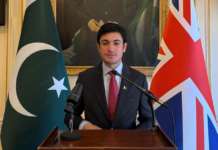The land of Afghanistan has faced several interventions in the past before the American intervention and no one can predict how many will it face in the future after US withdrawal.
Both the intervening states either lacked will and ability to plan an exit strategy or with will and ability invaders struggled with justifying a withdrawal and this is the reason that the poor exit strategy has enormous consequences for the region, especially for Pakistan.
Tracing back to past, the first intervention in Afghanistan was carried out by the British in the 19th century from 1839 to 1842 which ended with a lot of human and economical loses and this intervention left is the Durand Line conflict between Pakistan and Afghanistan.
The second intervention took place in the late 20th century when the Soviet Union deployed its troops in 1979 and failed to quell Afghanistan mujahideen’s insurgency. The dispute settled with the Geneva accord in 1989; however, this intervention led Pakistan into the Talibanization.
US amid the second intervention was also involved in Afghanistan at that time against USSR calling mujahideen’s “Holy Warriors” but Washington’s policy took a U-turn post 9/11 and the “Holy Warriors” were declared terrorists and the US came directly on the battlefront with the Afghan Taliban.
Like the other two imperial powers, America is also struggling hard for making an effective withdrawal policy. The Doha Accord agreed by both signatories was the culmination of the effective role played by regional actors Pakistan, China, Russia, Turkey, and Qatar.
According to the peace deal, the US will evacuate American and allied troops completely from Afghanistan by May this year provided the Taliban scaled back their operations against Afghan security forces and foreign troops.
Now Joe Biden has announced his policy that American forces will evacuate by September 9 of the current year, the 20th anniversary of 9/11 massacre. Taliban refused to take part in any peace talks after Biden’s announcement to delay troops withdrawal due to which Peace Conference which was going to be held on April 24 in Istanbul has been postponed. The delay in US evacuation is subjected to the issue of American logistics in Afghanistan for which Biden’s administration requires time.
According to New York Times report, the US has spent more than $2 trillion to sustain its presence in Afghanistan losing over 2400 soldiers. On April 14, American President Joseph Biden has announced that the US will not continue to expand its military presence in Afghanistan in the want of ideal conditions for withdrawal. Biden’s unconditional exit strategy is the manifestation that the US is now fully exhausted and trying to minimize the damage it has incurred amid War Against Terror.
This is Biden’s “America First” policy that he has ended “Forever War”. For him, the challenge of rising China and even Pakistan is more important than supporting Ashraf Ghani’s government. Biden has prioritized spending more on global issues like climate change, fighting pandemic, recession of economy, healthcare and education system.
Unfortunately, for the Afghan government in Kabul, it seems to throw them at the mercy of the Taliban and warlords. The aim of Americans to turn Afghanistan into a civilized and democratic state is no more than trash in the dustbin of history.
It might be possible that the Taliban would take over Kabul after the US withdrawal as it happened in the past after Soviet Union’s withdrawal. On April 15, BBC News has run the headline of the Taliban’s claim that they have won the war and America has lost. US exit from Afghanistan will unleash more powers in the region trying to safeguard their interests and therefore have a great impact on regional geopolitical relations.
The departure of American forces without any agreement would create problems for Pakistan. The current deadlock in intra-Afghan negotiations will gain strength and create instability in the region resultantly harming Pakistan’s interest by giving a push to refugees in an already economically stressed country and giving new ways to the smuggling of drugs and weapons promoting terrorism in the country.
The success of the Afghan Peace Process is dependent on intra- Afghan dialogue and the US is seeking help from Pakistan to induce the Taliban to stay tuned with the peace process and Pakistan’s key role in bringing both stakeholders of Afghanistan closer, can not be denied.
If all the regional stakeholders take some positive steps to break the deadlock of negotiations Afghanistan would become a stable country because a stable Afghanistan would mean a stable region resulting in regional development. Regardless of who the adversary was at any point, two generations of Afghan have known only war. It is a hard time that Afghans must decide that what they would opt for; war or peace.




